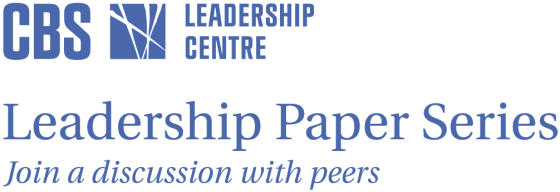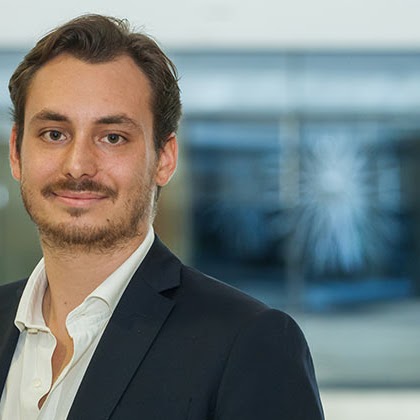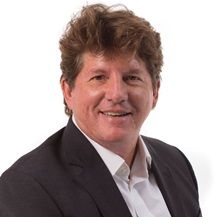
Loading
Wednesday 10. September 2025 at 10:00 to 12:00
Monday 8. September 2025 at 11:30
DH.2.V.070,
Dalgas Have 15,
2000 Frederiksberg
DH.2.V.070
Dalgas Have 15
2000 Frederiksberg

10th September 2025, at 10:00-12:00, room DH 2.V.070 at Copenhagen Business School, Dalgas Have, Frederiksberg
Refreshments: Coffee and pastries
The Second Life of Innovation: Leadership at the Edge of Failure
PAPER 1
Revival of Innovation Failures in R&D-Intensive Environments—A Case Study From a Japanese Chemical Company
By Peter Popovics, Assistant Professor, Department of International Economics, Government and Business
Failure is the most likely outcome of any innovation project, even within well-established firms. However, the failure of an innovation does not necessarily mark the end of its life cycle, as it can be revived. The existing literature primarily discusses two distinct revival approaches: external, involving a spin-out to external parties while retaining limited ownership of the innovation, or internal, occurring through accidental constellations, also known as serendipity. In this study, we explore a third approach, which involves a deliberate revival process while preserving the innovation's value within firm boundaries. We investigate these innovation failure revivals through three embedded cases of a Japanese R&D-intensive chemical company that has successfully revived multiple failed innovation projects. The study finds that the intertemporal transferability of a technology is largely determined during its development phase, making ‘technology elaboration’ a critical prerequisite for successful revival. Additionally, firms must complement internal revival efforts with external exploratory processes, integrating absorptive capacity (AC) with transformative capacity (TC) to identify new opportunities and acquire external resources. We further identify a key enabler of intertemporal technology transfer: a technology commitment decision that precedes the selection of technologies to maintain, ensuring a structured selection process over time. Finally, we demonstrate that TC enables not only the transfer of previously successful or shelved technologies but also those from failed innovation attempts, provided they are designated as strategically important “core” technologies.


|
Presenter: Peter Popovics, Assistant Professor, Department of International Economics, Government and Business
|
Discussant: Giacomo Marchesini, Assistant Professor, Department of Strategy and Innovation
|
PAPER 2
Adaptive Leadership: A Critical Interdisciplinary Review and Constructive Redirection for Future Research
By Kevin Lowe, affiliated to the University of Sydney
Modern organizational leaders are increasingly expected to demonstrate adaptive capabilities to navigate escalating volatility, uncertainty, complexity, and ambiguity. In response, the concept of adaptive leadership has attracted substantial attention from both scholars and practitioners. However, our systematic review of 87 peer-reviewed articles reveals that adaptive leadership's apparent conceptual richness masks fundamental theoretical incompatibility that threatens both scientific progress and evidence-based practice. Specifically, three dominant research streams, viewing adaptive leadership as (1) individual behavioral competencies, (2) emergent social process, and (3) sub-dimension of adjacent leadership constructs, advance mutually exclusive ontological and epistemological assumptions. This convergence under a single label constitutes a severe jingle fallacy disguised as mere definitional variation, which gives rise to conceptual contamination, where researchers inadvertently blend incompatible theoretical assumptions in their studies. Such contamination obstructs cumulative theory development and undermines the practical utility of adaptive leadership frameworks. To address these issues, we propose five strategic interventions for future studies: construct specification and disambiguation, integration of followership dynamics, systematic differentiation from adjacent frameworks, boundary condition identification, and methodologically sophisticated causal inference. We argue that adaptive leadership does not require incremental refinement but fundamental theoretical reconstruction to fulfill its potential for advancing rigorous science and guiding effective leadership in complex organizational environments.


|
Presenter: Kevin Lowe, affiliated to the University of Sydney
|
Discussant: Nicole Ferry, Assistant Professor, Department of Management, Society and Communication |
ABOUT THE SERIES
The CBS Leadership Centre wants to bring together researchers across CBS to inspire and nurture cross-disciplinary thinking on leadership. The Leadership Paper Series are a forum for doing exactly this. We invite junior and senior colleagues, as well as visiting and guest scholars, to present and discuss leadership research in progress from a variety of disciplinary perspectives and theoretical traditions. Presenters will receive constructive feedback from discussants and attendees with the aim of developing their papers and arguments for eventual publication.
Papers will be sent out to registered attendees before the event.
Let's stay connected! Interested in speaking at one of our future sessions? Send an email to Dan Kärreman dk.msc@cbs.dk or to Natalie Shefer nas.egb@cbs.dk.
Click to view the event location on Google Maps >
Copenhagen Business School
Phone: +45 3815 3815
seminar.ioa@cbs.dk
Copenhagen Business School
Phone: +45 3815 3815
seminar.ioa@cbs.dk